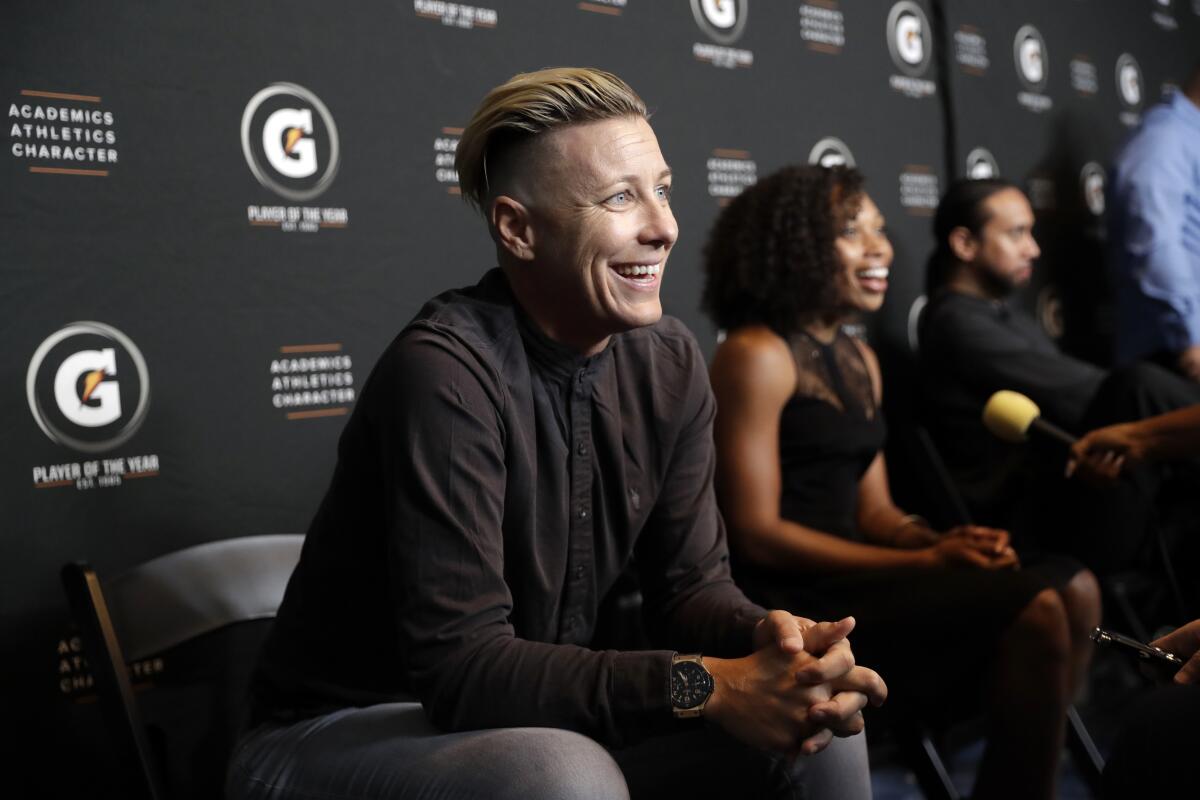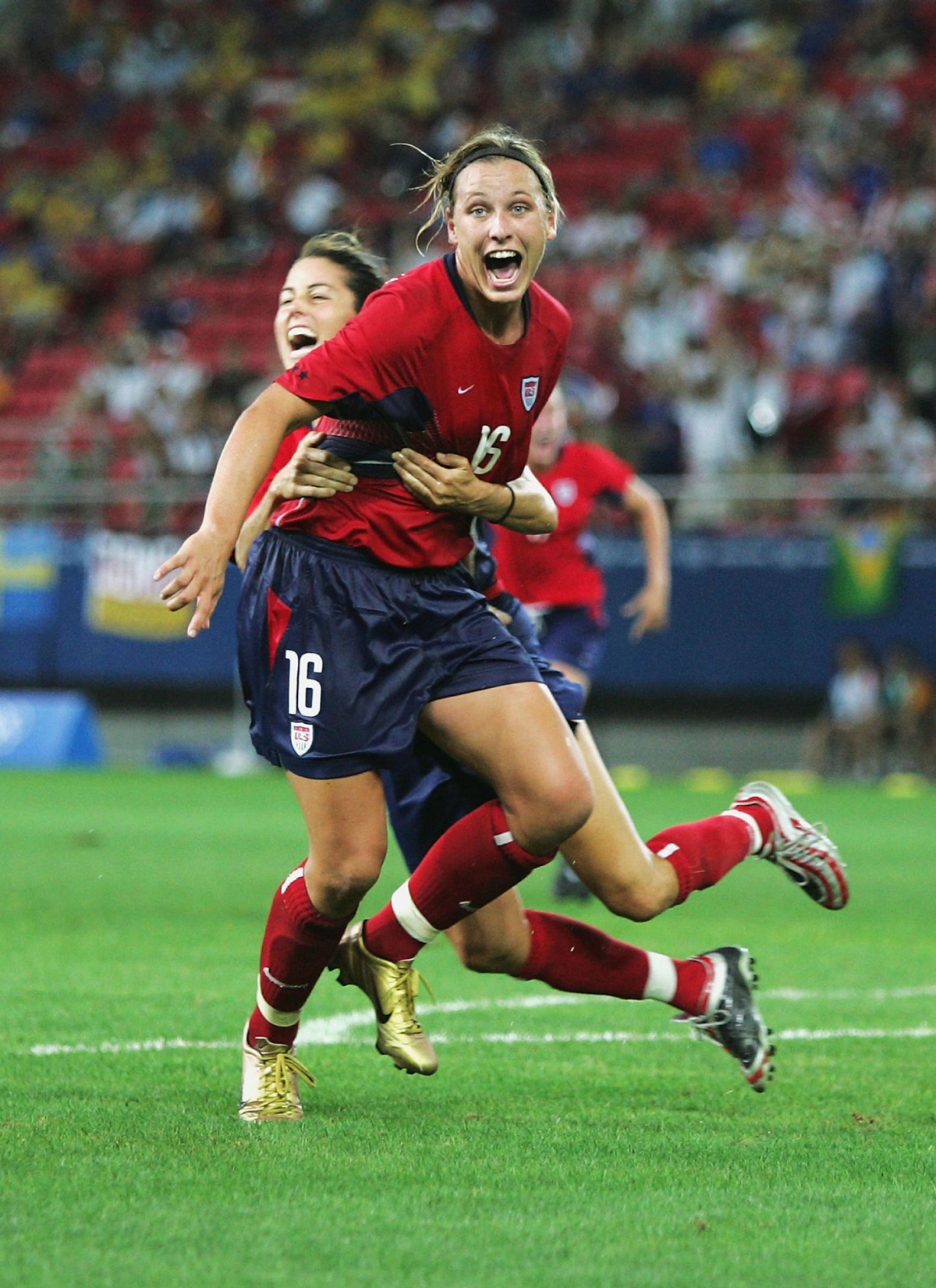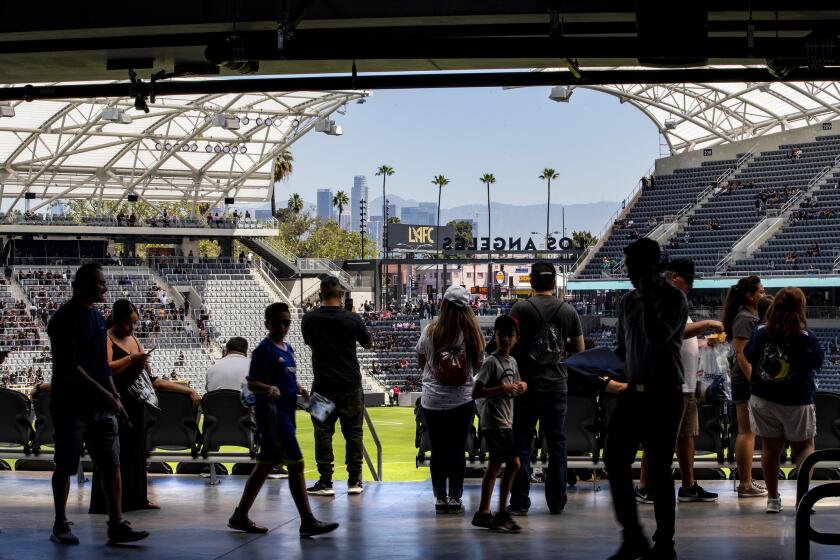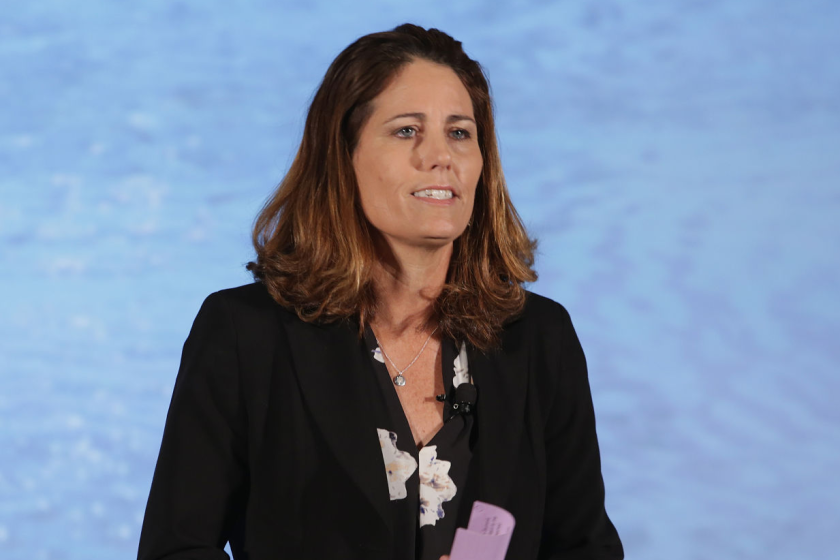Angel City FC’s ownership wants to bring a new philosophy to sports

- Share via
Nine months after Abby Wambach retired as international soccer’s all-time leading scorer, ESPN honored her and two other sports icons, the Lakers’ Kobe Bryant and NFL quarterback Peyton Manning.
As the trio walked off the stage at the Microsoft Theater that night in 2016, Wambach couldn’t help noting they were headed for very different futures. Bryant earned more than $328 million in the NBA and Manning nearly $250 million playing football. Endorsement deals would pay them millions more. Neither would have to work again.
Wambach, on the other hand, needed a job.
“Each of us had made the same sacrifices for our careers; shed the same amount of blood, sweat and tears,” Wambach wrote in her book “Wolfpack.” “But our retirements wouldn’t be the same at all.
“Their hustling days were over. Mine were just beginning.”
Angel City has a home after reaching an agreement to share Banc of California Stadium with LAFC.
Part of that hustle landed Wambach among the ownership group of Angel City FC, Southern California’s newest professional team, which will begin play in the National Women’s Soccer League in 2022. And she’s promising to use that position to level the playing field for women athletes by pushing for higher salaries, better working conditions, even 401(k) benefits so they too can retire with dignity, not debt.
It’s a new approach to an old problem. Rather than waiting for enlightened team executives or progressive sponsors to advocate for women athletes, Wambach has gone inside the owners’ suite to join with a number of other like-minded women to force that change.
In the decades-long fight for gender equality in sports, progress has come slowly and has largely been pushed by athletes. Billie Jean King had to threaten a boycott of the U.S. Open to get officials of that tennis tournament to approve equal pay for the men’s and women’s champions. Now she is also an Angel City owner.
The women’s national soccer team, winner of a record four World Cups, repeatedly has used boycotts, lawsuits and the threat of lawsuits to push its demands with the U.S. Soccer Federation. Fourteen of its former players also are Angel City investors, part of a sprawling ownership group that includes A-list Hollywood celebrities Natalie Portman, Jessica Chastain, Eva Longoria, Jennifer Garner and America Ferrera.
This is not fighting against a man anymore. We are now all on the same team. We are creating a whole new idea of professional sports team ownership.”
— Abby Wambach
Most important, nearly four dozen of the team’s 60-plus investors are women — including champion athletes Serena Williams, Lindsey Vonn and Candace Parker — making it the largest female ownership group in U.S. sports history. And most of those women have histories of advocating for equal rights.
“This is not fighting against a man anymore,” Wambach said from her home in Naples, Fla. “We are now all on the same team. We are creating a whole new idea of professional sports team ownership.”
Giving them the wet clay of an expansion team to develop that vision could have a profound impact on how women pro athletes are treated in the U.S. going forward, said Richard Lapchick, director of the Institute for Diversity and Ethics in Sport at the University of Central Florida.
“For me it’s a great breakthrough,” said Lapchick, noting that Angel City’s owners are promoting change not because someone is demanding it, but because it’s the right thing to do.
“This team is going to be looked at as a team of social justice warriors as well as the team of vanguard athletes,” he said.
Wambach has been both. As an athlete she won a World Cup and two Olympic gold medals and was inducted into the National Soccer Hall of Fame after retiring with 184 international goals, most by any player, male or female.
As a social justice warrior she has been an outspoken proponent of LBGTQ causes and led an effort to sue FIFA, the powerful ruling body for global soccer, to block plans to play the 2015 Women’s World Cup on artificial turf fields, a dangerous surface that has long been banned in the men’s competition. In that last case she lost the battle but won the war. The women withdrew their lawsuit and played that World Cup on artificial turf, but four years later FIFA decreed that only grass fields would be accepted in the future.

“One of the first things Abby said was, ‘Hey, can we look into, as owners, creating some type of retirement fund for the players?” Julie Foudy, a two-time World Cup champion, remembers of her first Zoom call as an Angel City owner in September. “I never had that. That was really the catalyst behind Natalie Portman saying, ‘Why do men athletes retire from the the game in a much different position from women?’”
That idea didn’t start with Wambach. Early in 2020, the WNBA agreed to a labor deal that calls for higher pay, pregnancy benefits, college tuition reimbursement and a 401(k) in which the league’s contribution rises with a player’s service time. The U.S. Soccer Federation, which pays six-figure salaries and benefits to national team members, also provides a 401(k) plan.
The NWSL, though, has a minimum salary of just $20,000 and offers no retirement assistance to its players. Because it operates under a single-entity business model, the NWSL would have to approve such benefits leaguewide, and though it has shown little desire to do so in the past, Angel City’s push could soon get that on the table since freshman Commissioner Lisa Baird has called for improved working conditions.
This winter the league added other progressive and deep-pocketed investors who also figure to become allies in Angel City’s push for change: Brittany Matthews, who played professional soccer in Iceland and is the fiancée of Kansas City Chiefs quarterback Patrick Mahomes, is part of a female-heavy ownership group of the NWSL team that will begin play in Kansas City next season, while healthcare technology entrepreneur Y. Michele Kang became the first woman to buy a stake in the Washington Spirit.
The league might soon have no choice but to change. For most of its seven-year existence, it was the top women’s league in the world but recently well-funded alternatives in England, France and Spain have begun to challenge the NWSL, with six national team players leaving the U.S. league to play in Europe in 2020.
“It’s important that us athletes understand our power, understand our experience, and then use it to create a better experience and more power for the next generation, for the future of women’s soccer.”
— Abby Wambach
“The players of the NWSL are the best in the world at what they do, and they need to be treated like it,” said Baird, who staved off calls to cut salaries last summer, as MLS did, then led the league through two successful tournaments during a raging pandemic. “Whether it’s facilities or housing or compensation or healthcare, I’m proud of what we accomplished this year and intend to up the ante in every way possible.”
Wambach believes whatever advances are made must be dramatic and long-lasting. Angel City, with its mix of committed owners and former players, is perfectly positioned to lead that revolution.
“All of us have experience of some marginalization and some form of mistreatment because we were women in a man’s world,” she said. “But here we now have an ability to literally create a new way. All of us are attaching ourselves to the idea of the creation of something completely new because institutionally things need to change.
“It’s important that us athletes understand our power, understand our experience, and then use it to create a better experience and more power for the next generation, for the future of women’s soccer.”
Foudy agrees. As co-captain of the national team during a bitter contract dispute with U.S. Soccer 20 years ago, then later as the player representative on the board of the directors of the short-lived Women’s United Soccer Assn., the first attempt at a large-scale women’s professional soccer league, she saw first-hand the disconnect between the boardroom and the locker room. Angel City, she believes, will benefit from having former players pushing the agenda.
“I get cold sweats when I look back on what we had with the WUSA and its ownership group,” said Foudy, a Hall of Famer like Wambach as well as past president of the Women’s Sports Foundation. “There should be players on every ownership group, in terms of just being able to provide a perspective that a lot of owners don’t have. You see that in other leagues, but we have yet to see that on a larger scale in women’s sports.
The majority-female group of founding investors in Los Angeles’ NWSL franchise see the team as a chance to build and develop women’s soccer.
“This, hopefully, is a playbook for not just soccer but for other sports as well.”
Exactly what that playbook will include is unknown since its hasn’t been written yet. The degree to which Angel City can make noticeable change might be limited to the hallways and practice fields of its training center, which hasn’t been built yet.
But that hasn’t dampened the team’s ambition.
“We’re not just building a soccer club. We want to build an organization that has impact,” said entrepreneur Julie Uhrman, the team’s president and one of its three founding owners.
“We want to set higher expectations for ourselves, for the players, for the league.”
So the coaching staff, which has yet to be hired, will focus on wellness and mental health in addition to the players’ performance on the pitch, Uhrman said, and there will be a staff position dedicated to handling “player needs.” Neither idea has been widely tried in women’s sports in the U.S. and Angel City’s decision to adopt them reflects the influence former players have had on the fledgling franchise’s development.
“Having access to these 14 incredible former players really gives us a good understanding of what the players go through every single day,” Uhrman said.
The club will also help teach financial literacy, product development and social media skills to its players.
“What is our philosophy? What is our culture? And how do we plan on treating players?” Uhrman asked. “It’s the same thing when I hire someone for the front office. I have to make sure they have a computer and they have a phone right?
“Well, the players need the same things. We’re actively working on all those right now.”
The impact of that work might not be felt until Angel City’s first game, which is still 16 months away. But for Wambach, the idea that the conversation is taking place is progress long overdue.
“To democratize professional sports team ownership for a marginalized group of people like women is something that’s never really been done before, right?” she said. “This model can be replicated and we want to do it in a way that is sustainable.
“This is real activism at work here. And when a group of women come together with a singular goal, there’s nothing that’s going to keep them from accomplishing that goal.”










